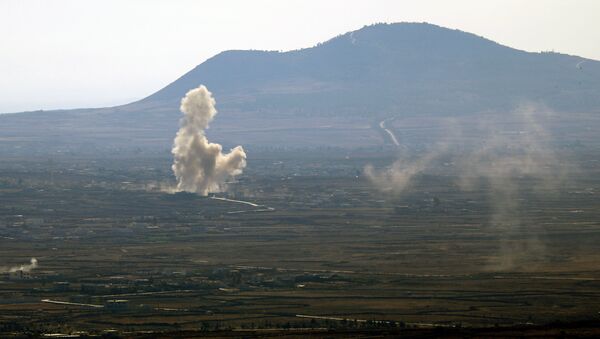Lebanese officials have expressed concern over the fate of Shebaa Farms in the wake of US President Donald Trump’s decision to recognise the Golan Heights as part of Israel.
Shebaa Farms are a small strip of land located at the intersection of the Lebanese-Syrian border and the Golan Heights. While Israel considers Shebaa Farms part of the occupied Golan region, Damascus and Beirut insist that the area is Lebanese.
READ MORE: Syria to US on Golan Heights: 'You Can Give Israel North and South Carolina'
The London-based, Saudi-owned newspaper Asharq al-Awsat quoted an unnamed Lebanese official as claiming that Shebaa Farms were not part of the Golan Heights because “no one mentioned our land to declare its annexation to Israel”.
“Therefore, the official Lebanese positions were limited to criticising the move because it affects Syria and its lands. Our occupied territories were never part of Golan,” the official added.
The comments followed Lebanese President Michel Aoun’s statement that Washington’s new stance on the Golan Heights was a “black day for the world” and an “arbitrary action” that runs counter to international law.
READ MORE: Gift to Bibi or Blow to Syria? Possible Motives Behind US Golan Heights Decision
Trump signed a presidential proclamation recognising Israel’s sovereignty over the Golan during his meeting with Prime Minister Benjamin Netanyahu in Washington on Monday, a move that was rejected by an array of countries, including Russia, Syria, Turkey and Canada.
Arab League Secretary-General Ahmed Aboul Gheit, for his part, pointed out that “the US statement does not change anything in the status of the Golan Heights”.
“The Golan is a piece of occupied Syrian territory. […] Occupation is a serious crime, but attempts to legalise this occupation is also a great mistake,” he underscored.
READ MORE: Trump's Golan Move Against Whole World, Syria to Retaliate — War Correspondent
The disputed Golan Heights were seized from neighbouring Syria by Israel following the 1967 Six-Day War; the move was never recognised by the international community.
Israeli Prime Minister Benjamin Netanyahu has, in turn, repeatedly emphasised that the Jewish state would not agree to meet Syria’s demands and retreat to the 1967 lines, because they were “indefensible”.



